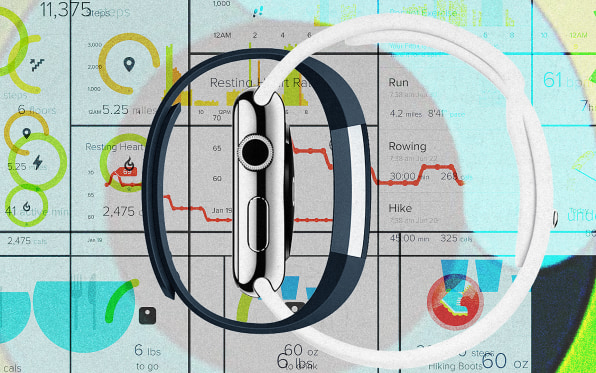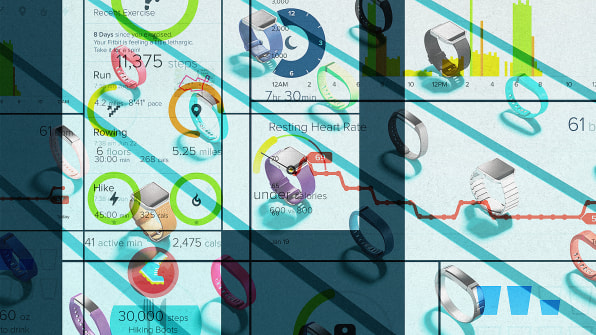Should You Work on Your Arms for Track and Field
Walking around the block just to get to 10,000 steps? You are probably missing the point.
A new study shows that measuring your steps, your sleep, how far you ride your bike, or even your sexual activity, spoils your enjoyment of them.
While tracking some activities can motivate us to do more, it can also decrease our enjoyment of the activity, turning that walk into a chore to be completed, not a relaxed stroll to be enjoyed. Worse, it may even put you off the activity to the extent that you do it less, or stop doing it altogether.
The new study, lead by Jordan Etkin of Duke University, details six experiments which set out to see if measuring our activities a) does in fact incentivize us to do them more, and b) whether tracking our activity spoils our enjoyment. The short answer is yes, in both cases.
"By drawing attention to output, measurement can make enjoyable activities feel more like work, which reduces their enjoyment," says Etkin. "As a result, measurement may decrease consumers' interest in continuing to do the activity in the future and even reduce how happy and satisfied people feel overall."

While measurement does seem to make us do more, the attachment of quantifications to pleasurable activities makes them less attractive. Etkin cites a previous study in which children were rewarded for coloring. The kids that got rewarded were less interested in coloring in the future. "These external incentives presumably made children see the activities as instrumental to achieving the rewards, rather than as valuable in their own right, reducing their enjoyment," says Etkin.
Activities like coloring, walking, or reading are enjoyable enough that we do them for their own sake. By measuring steps taken, or tracking a page count, we start to do the activity for the reward instead of for enjoyment, and this is what puts us off. It makes it like work, which most people do for the reward of money.
Etkin's experiments were designed to tease out these effects from other factors and to test for other explanations for the diminished enthusiasm of the subjects. For instance, to see whether the counting itself is distracting enough to reduce the attention we pay to the enjoyable activity, Etkin's team interrupted test subjects in other ways, finding that these interruptions weren't as bad as the counting itself.
The experiments ranged from simple to complex. One had subjects spend 10 minutes coloring in shapes. They were told that the speed or quality of their coloring didn't matter. One group colored without any feedback. The other group could see a counter which increased every time they finished a shape. Both groups were then asked "To what extent do you find coloring: enjoyable, boring, interesting, a waste of time, and fun?" Measurement increased the output of the colorers, but they enjoyed it less.

Another experiment put pedometers onto the test subjects. Some were told that the test was just to see how comfortable the pedometer was to wear, and the display was taped shut. And wearing a pedometer was optional, so some subjects walked all day, unencumbered. The result? "Tracking step count led participants to walk more, but decreased how much they enjoyed walking." Enjoyment was even reduced amongst those who chose to be tracked.
"This shows that even for enjoyable activities," says the study, "making measurement available may encourage consumers to opt-in, and the very people who self-select into measurement are the ones who are hurt by it."
As Etkin points out, there's already lots of research showing that external rewards tend to dim our enthusiasm, but his study indicates that self-measuring also spoils our fun. And the twist is that the very people who most enjoy an activity are the ones most likely to spoil it by quantifying it. An avid reader is far more likely to use an app that tracks their reading progress than someone who reads one paperback a year, on the beach. The research has implications for those of us who use trackers to help reach goals–to get fit or lose weight. It mightn't seem to matter that we enjoy the exercise, but if a daily stroll becomes a chore we risk giving up altogether. "Measurement's overall impact may be negative because it hurts enjoyment, continued engagement and subjective well-being," says Etkin.
One partial solution is to keep measuring. Because counting still incentivizes us, one real danger comes after we stop measuring our activities, when we suffer the double-whammy of reduced enjoyment, plus the lack of incentive.
"Once people begin tracking a behavior, they may thus be better off continuing to do so," says the report.
One exception to the rule is when you are counting towards a goal. The tests show that counting for the sake of counting is the real engine of discouragement. "Measurement may also not reduce enjoyment when activities are performed in the service of a goal (e.g., reading in order to learn or running on a treadmill to get in shape). In such cases, measurement may even enhance enjoyment." Setting goals, then, may help your enjoyment by giving you a boost when you achieve them.
So don't ditch the Fitbit just yet. The key may be to change how these devices relay their information to us. The Apple Watch, for instance, tells you to stand up throughout the day if you've been sitting around for too long. And while it does also track your activity, perhaps a friendly reminder is all you need. Maybe we should let the computers take care of the counting, so we can take care of enjoying what we already love.
Should You Work on Your Arms for Track and Field
Source: https://www.fastcompany.com/3057692/tracking-your-leisure-activities-makes-them-feel-like-work
0 Response to "Should You Work on Your Arms for Track and Field"
Post a Comment